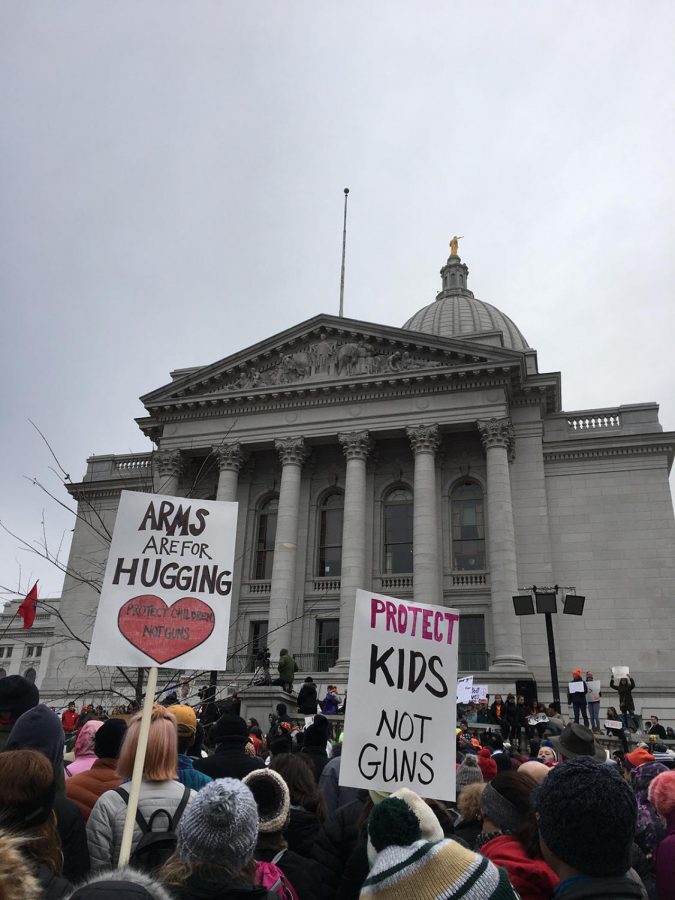Protesters demand gun legislation change
March for Our Lives, a movement started by millennials, faces criticism from older generations
Photo by Clara Newport
Wisconsin Senator Tammy Baldwin was one of the speakers at the March for Our Lives rally in Madison. Baldwin’s speech was echoed by area high school students.
“Enough is enough! Enough is enough!”
The chant rattles off the building bricks and washes over a packed State Street. Inside the sea of protesters there are strollers, sneakers and wheelchairs moving toward the Wisconsin State Capitol. Poster boards flutter in the brisk spring wind.
About 2,500 people showed up and spoke out at Madison’s March for Our Lives last Saturday, March 24. Following a country-wide school walkout, the march, at its base, was a protest against gun violence in America.
As I made my way toward the Capitol, I walked next to a freckled girl who was about elementary school-age. She held a white sign that read “Arms are for hugging” in black marker. Careful red hearts encircled the writing.
Behind me, there’s an older man named Terry Maloney who said he is a hunter marching for gun regulation. He carried a sturdy sign that read “Bullets aren’t school supplies.”
“I don’t see the need for assault rifles,” Maloney said. “The deer are not attacking us.”
It was the rally’s age demographics that made Saturday inspiring. It was refreshing to see middle-aged Wisconsinites support a movement created by millennials.
According to CNN, the event in Madison was one of more than 800 sister marches that took place across the United States. USA Today estimates Saturday’s rally was one of the biggest single-day protests in Washington, D.C.’s history.
March for Our Lives was created by the student-survivors of the Parkland, Fla. massacre. The movement’s website states it is pushing for gun control legislation at a national level.
“School safety is not a political issue,” March for Our Lives mission statement says. “There cannot be two sides to doing everything in our power to ensure the lives and futures of children who are at risk of dying when they should be learning, playing and growing.”
First, students organized a school day walkout on March 14, according to Time. The March 24 rally was in works days after the shooting, with Emma González, a Marjory Stoneman Douglas High School senior, as the face of the movement.
In the weeks leading up to the walkout, I stumbled upon Facebook posts insisting students “walk up” instead of out. The Walk Up, Not Out counter-movement was created by a father of Parkland shooting victim. It encouraged schoolchildren to be nicer to their peers — to prevent development of future shooters — instead of participating in the nationwide walkout.
America is working against young activists instead of supporting them. While heartwarming at surface level, Walk Up is problematic for a number of reasons.
The biggest disagreement I have with the counter-movement is its victim blaming undertones. It suggests that if student victims had devoted more time to being friendlier to others, they wouldn’t have been shot. This is grossly simplifying the gun violence epidemic.
It is concerning, too, that Walk Up seems to label people with mental illnesses as the main cause for every shooting — the root issue is really our gun regulation laws. In fact, a new study found people with mental illnesses are often targets of violence, rather than perpetrators. When we generalize people with mental illnesses, we risk creating dangerous stereotypes.
Walk Up suggests that simply talking to someone who seems lonely or depressed would suddenly “cure” a person of their mental illnesses. While I certainly don’t discount kindness, Walk Up cannot be our only solution to the deeper obstacle we face with mental illness. We need a better understanding of mental illness so that we can provide care for those who live with it.
Finally, Walk Up ignores the push for legislative revolution. Blaming victims and those with mental illnesses will not produce the bills we need to solve America’s horrific obsession with guns.
I asked eleven-year-old Ben Pralat, who walked with his mom in Madison on Saturday, why he was marching. After some thought, his answer was simple.
“We’re the only country that has this problem,” Pralat said. “It’s time that we change.”

Neupert is a fourth-year journalism student at UW-Eau Claire. She is the executive producer of Engage Eau Claire on Blugold Radio Sunday. In her spare time, Neupert's working on becoming a crossword puzzle expert.

